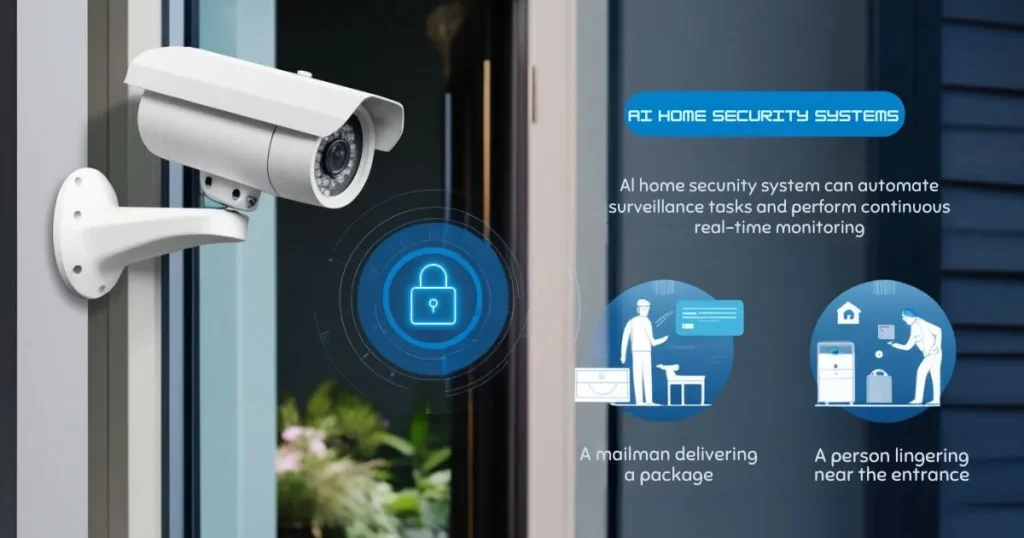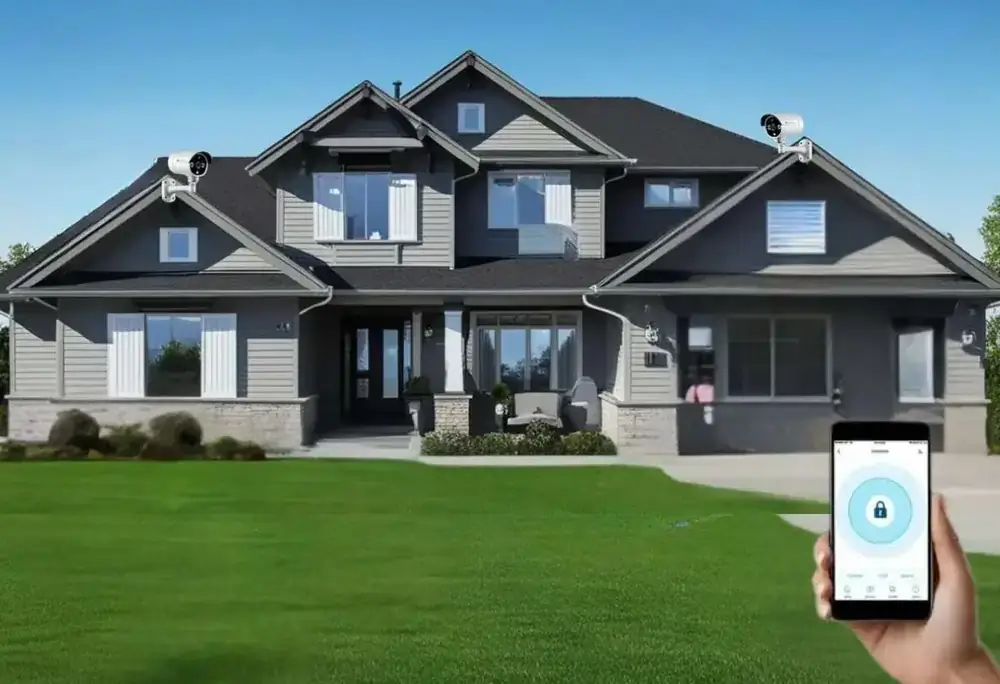Home security is more important than ever, but homeowners may need to implement more than just traditional security systems to combat modern threats.
With the rise of artificial intelligence, many wonder if AI-powered home security solutions are the future or simply a fad. Is AI-equipped home security worth the hype, or are we being swept away by the latest trend?
In this article, we’ll explore the world of AI home security to answer that question. From enhanced surveillance capabilities to the potential for smarter threat detection, we’ll explore whether AI is revolutionizing home security for good or just another tech buzzword.
Did you know the global AI home security market will grow to $5 billion by 2028?
Let’s determine if this growth is driven by real innovation or temporary excitement.
Key Takeaways:
- AI home security integrates advanced surveillance and real-time threat analysis.
- Benefits include personalized responses, facial recognition, and automation.
- There are concerns about privacy, cost, and over-reliance on tech.
- AI home security shows potential for long-term adoption, but it’s not without its challenges.
What Is AI Home Security?
AI home security integrates advanced technologies, such as machine learning algorithms, facial recognition, real-time monitoring, and predictive analytics, to provide enhanced home protection.
Conventional security systems strongly depend on human operators for functionality and often take a reactive approach. AI transforms the game by providing instant analysis, recognizing unusual behavior, and improving its ability to anticipate potential risks over time.
Key Elements of AI-Based Home Security
AI-Powered Cameras and Video Doorbells
The Nest and Ring doorbells are examples of such devices. They offer homeowners real-time video monitoring and analytics powered by artificial intelligence, while conventional security systems rely heavily on human operators for functionality.
Automated Surveillance
Traditional security systems are often passive, relying on human operators to watch feeds and respond to threats. AI home security systems, on the other hand, can automate surveillance tasks and perform continuous real-time monitoring.
For example, an AI-powered system can distinguish between normal daily activities (like a mail carrier delivering a package) and potential security threats (such, a person lingering near the entrance).
Facial Recognition and Biometrics.
AI home security systems can also include biometric authentication through facial recognition technology or multi-factor authentication. This ensures that access is granted exclusively to authorized individuals., thereby preventing unauthorized entries.
Adaptability and Machine Learning
AI systems can recognize threats and acquire knowledge from them. As they gather more data, they adapt and improve their ability to identify new forms of abnormal behavior. This proactive approach allows AI-powered home security systems to prevent potential issues before they escalate.
Check out this guide on how to set up a fully functional smart home security system for more details.
How AI Is Transforming Home Security
AI is reshaping the field of security systems by making them more innovative, more efficient, and more responsive to suspicious activities. Here’s how AI is doing that:
Proactive vs. Reactive Security
Traditional home security systems are primarily reactive—they sound an alarm after an event has occurred. AI home security is proactive. By using predictive analytics, these systems can anticipate threats based on past patterns and provide real-time alerts.
This proactive approach could be the key to reducing break-ins and giving homeowners peace of mind.
For example, AI-powered systems can detect when an unfamiliar person approaches your home and trigger alerts based on pre-defined behaviors, such as standing near the door for an unusual amount of time or moving in erratic patterns. Traditional systems need help to achieve this kind of real-time threat detection.
False Alarms Minimization
One of the most common issues with traditional security systems is the prevalence of false alarms. Whether it’s a gust of wind knocking over a garden gnome or a stray animal wandering by, these systems aren’t always able to differentiate between real threats and harmless events.
With AI, machine learning algorithms help the system learn from previous events, allowing it to identify potential security threats while ignoring benign occurrences more accurately. This reduces the frequency of false alarms and ensures that homeowners and security professionals only need to respond to genuine threats.
AI-Powered Video Analytics
AI cameras, like those used in Nest and Ecobee, can analyze vast amounts of video footage in real time, detecting unusual activities and even identifying specific objects such as packages or vehicles. They use deep learning to identify behavior patterns, such as spotting someone repeatedly passing by your house and raising alerts for suspicious behavior.
For a detailed comparison between Nest and Ecobee, check out this Nest vs. Ecobee: Which Smart Thermostat Reigns Supreme?
Advantages of AI Home Security Systems
AI offers a wide range of benefits for home security, both in terms of efficiency and safety. Here are some of the key advantages:
Enhanced Real-Time Threat Detection
With AI-powered surveillance cameras, homeowners can receive real-time notifications whenever unusual activities are detected. This allows them to act quickly by contacting law enforcement or activating other security measures.
For instance, AI systems can identify potential intruders, recognize their faces, and immediately alert the homeowner’s phone. This real-time monitoring feature allows for faster decision-making, which could prevent theft or other incidents.
Cost Savings and Efficiency
AI systems reduce the need for on-site security personnel, providing homeowners and businesses with cost savings. AI-powered surveillance systems can monitor properties 24/7 without fatigue, ensuring continuous and reliable security coverage.
Reduced False Alarms
By analyzing vast amounts of data and understanding regular activity patterns, AI security systems can minimize false alarms, ensuring that homeowners are only notified when there’s a genuine threat, reduce nuisance alerts, and improve overall trust in the system.
Adapting to New Threats
Designers continuously improve AI security solutions. Through machine learning, they can recognize new threats based on historical data and provide a more adaptive approach to security.
For instance, as AI collects data about new cyber threats or physical security risks, it can better safeguard against emerging security breaches.
For more about smart home energy management that integrates with AI security systems, visit smart home energy management.
Challenges and Concerns of AI in Home Security

While AI home security systems offer many benefits, they also come with many challenges, including privacy concerns and ethical dilemmas.
Privacy Risks
One of the main concerns surrounding AI-powered surveillance systems is the invasion of privacy. These systems collect massive amounts of data, often in private spaces like homes, raising concerns about how this data is stored, shared, and used.
According to a Pew Research study, many consumers are increasingly concerned about how companies use their data. The presence of facial recognition and biometric data in AI home security systems could pose a significant privacy risk if misused.
Vulnerabilities and Cybersecurity Risks
AI systems, especially those connected to the Internet of Things (IoT), can be vulnerable to cyber-attacks. Without advanced cybersecurity measures, hackers could exploit vulnerabilities in AI systems, gaining unauthorized access to personal data or even controlling smart home devices remotely.
Ensuring robust cybersecurity protections is critical, particularly for homes integrating AI systems into their critical infrastructure, such as security cameras and alarm systems. For businesses, cybersecurity professionals will play a crucial role in defending against these threats.
Ethical Considerations
As AI continues to evolve, the line between protection and surveillance blurs. The deployment of AI in public spaces and even private homes raises questions about the ethical implications of constant monitoring.
Could AI home security become a tool for mass surveillance? What happens when AI misidentifies a person or action?
For those looking to balance privacy with security, see our guide on securing your smart home.
Is AI Home Security the Future or Just a Trend?

So, is AI home security here to stay, or is it just another trend? The answer lies in how well these systems can address the concerns we’ve discussed while continuing to offer innovative solutions for modern security needs.
Long-Term Adoption Trends
The adoption of AI in home security systems is on the rise, driven by AI-powered cameras, smart speakers, and intelligent security systems that provide real-time alerts and data-driven decision-making.
Many security sector business leaders are investing in AI technologies, indicating a solid future for this approach.
Technological Advancements
AI’s continuous learning capabilities through machine learning and deep learning make it highly adaptable to new threats. As these systems improve, they could become more reliable than human operators, leading to a paradigm shift in how we view home security.
Consumer Trust
While AI holds significant potential, its widespread success will depend on consumer trust. Consumer perspectives on privacy and data security will determine whether AI home security becomes the norm or remains a niche market.
For those looking to take a deeper dive into consumer technology, explore our budget-friendly smart home tips.
AI Home Security—A Future Trend with Lasting Impact?
In conclusion, AI home security offers many advantages that traditional systems can’t match, such as real-time monitoring, predictive threat detection, and cost savings.
However, its challenges—particularly regarding privacy risks and cybersecurity vulnerabilities—must be carefully addressed to ensure long-term success.
AI is not just a trend. With continued advancements in machine learning, biometric authentication, and deep learning, AI home security is poised to play a significant role in shaping the future of home safety.
But like all technologies, its success will depend on how well it addresses the critical issues facing consumers today.
For more insights on creating a fully integrated smart home, check out our article on DIY smart home projects.
Frequently Asked Questions:
1. What is security technology?
Security technology refers to the tools and systems designed to safeguard individuals, properties, and information from various threats. These include physical security measures like alarm systems, surveillance cameras, and cybersecurity solutions to protect data and digital infrastructure from cyber-attacks.
2. What are the components of security technology?
Security technology typically comprises several components., including:
- Surveillance systems (e.g., CCTV cameras, AI-powered cameras)
- Alarm systems (e.g., burglar alarms, fire alarms)
- Access control systems (e.g., biometric authentication, smart locks)
- Cybersecurity measures (e.g., firewalls, encryption, intrusion detection systems)
- Environmental sensors (e.g., flood detection, smoke sensors)
Explore our smart home security systems article for more detailed insights into security components.
3. How can security professionals use Artificial Intelligence to perform better?
AI can assist security professionals by:
- Automating routine surveillance tasks like monitoring camera feeds.
- AI-powered analytics can predict and detect potential threats using machine learning.
- Offering real-time alerts on suspicious activities, improving response times.
- Reducing false alarms by distinguishing between usual and unusual behaviors.
- Using predictive analytics to anticipate security breaches and take preemptive actions.
4. Can AI soothe home security paranoia?
Yes, AI can help reduce home security concerns. With real-time monitoring, facial recognition, and smart assistant integration, AI provides more accurate threat detection and instant notifications, giving homeowners peace of mind and minimizing unnecessary anxieties caused by false alarms.
5. What products and services do these industries provide?
The security technology industry offers a variety of products and services, including:
- AI-powered cameras and video doorbells
- Smart locks and biometric access systems
- Intrusion detection systems
- Cybersecurity services
- Monitoring services for real-time threat detection
- Smart home security devices integrated with AI and IoT.
Read more about smart security products in our article on the best smart locks for security and convenience.
6. What is artificial intelligence?
Artificial Intelligence (AI) is a branch of computer science focused on creating machines capable of mimicking human intelligence. It involves systems that can learn from data, recognize patterns, and make decisions, allowing them to perform tasks like threat detection, facial recognition, and decision-making in security settings.
Check out our guide on setting up a smart home for practical advice.
6. How can enterprises accelerate AI adoption safely and securely?
Enterprises can safely accelerate AI adoption by:
- Implementing advanced cybersecurity measures to protect AI systems.
- Ensuring privacy risks are mitigated with strong data encryption and compliance with laws.
- Encouraging cross-functional teams involving security professionals and data scientists to oversee AI integration.
- Starting with small pilot projects to test AI capabilities before full-scale deployment.
- Using AI-powered analytics to enhance both cybersecurity and physical security systems.
For businesses looking to accelerate AI adoption, our article on DIY smart home projects can provide a starting point for integrating innovative AI technologies.


